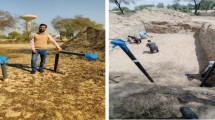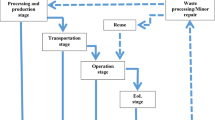Abstract
This study presents the analysis of the energy and exergy utilization of the Balıkesir space-heating sector (BSHS) in the years of 1996 and 2010 and environmental impacts of their usage. In this analysis, actual data were used in the calculations. Total energy and exergy inputs are calculated to be 3.58 and 3.68 PJ in 1996, while they are determined to be 4.55 and 4.69 PJ in 2010, respectively. Annual fuel consumptions in space heating are determined according to appliances. The overall space heating energy efficiency value for the BSHS is found to be 48.46 % in 1996, and is determined to be 66.89 % in 2010. The exergy efficiency value for that is obtained to be 3.26, 3.83 % in the analyzed years, respectively. The present study clearly indicates the necessity of the planned studies towards increasing exergy efficiencies and decreasing emission values in the sector studied and especially the critical role of policy makers in establishing effective energy-efficiency delivery mechanisms throughout the country. It may be concluded that the current methodology is useful for analyzing the sectoral energy and exergy utilization, giving energy saving opportunities.

Similar content being viewed by others
Abbreviations
- a :
-
Type of energy
- e :
-
Share of electrical energy use
- ex :
-
Specific exergy (kJ/kg)
- Ex :
-
Exergy (kJ)
- f :
-
Share of fuel use
- HHV :
-
Higher heating value (kJ/kg)
- ke :
-
Kinetic energy (kJ/kg)
- m :
-
Mass (kg)
- Q :
-
Heat transfer (kJ)
- q :
-
Quality factor of an energy carrier
- T :
-
Temperature (K)
- W :
-
Shaft work, work (kJ)
- \({\varepsilon_{1}}\) :
-
Energy (first law) efficiency (%)
- \({\varepsilon_{2}}\) :
-
Exergy (second law) efficiency (%)
- γ:
-
Exergy grade function
- 0:
-
Dead state or reference environment
- c :
-
Component
- d :
-
Direct
- e :
-
Electrical
- f :
-
Fuel, first
- h :
-
Heating
- ke :
-
Kinetic energy
- o :
-
Overall
- p :
-
Product
- Q :
-
Heat
- osh :
-
Overall space heating
- s :
-
Stream
- sh :
-
Space heating
- W :
-
Work
References
Dincer I.: Thermodynamics, exergy and environmental impact. Energy Sources 22, 723–732 (2000)
Rosen M.A., Dincer I.: On exergy and environmental impact. Int. J. Energy Res. 21, 643–654 (1997)
Rosen M.A., Scott D.S.: Entropy production and exergy destruction: Part I—Hierarchy of Earth’s major constituencies. Int. J. Hydrog. Energy 28(12), 1307–1313 (2003)
Wall G., Gong M.: On exergy and sustainable development-Part 1: Conditions and concepts. Exergy An Int. J. 1(3), 128–145 (2001)
Cengel, Y., Wood, B.: Bigger is not necessarily better: a thermodynamic point of view, Part I: Technical aspects. In: Proceedings of First International Conference on Applied Thermodynamics, ECOS’01 Efficiency, Cost, Optimization, Simulation and Environmental Impact of Energy Systems, Istanbul, Turkey, vol. 1, pp. 91–98 (2001)
Cengel Y.: Examining the merging and splitting processes in daily life in the light of exergy. Exergy Int. J. 2(3), 128–134 (2002)
Dincer I.: Environmental issues: I-energy utilization. Energy Sourc. 23, 69–81 (2001)
Utlu Z., Hepbasli A.: A review on analyzing and evaluating the energy utilization efficiency of countries. Renew. Sustain. Energy Rev. 11(1), 1–29 (2007)
Utlu Z., Hepbasli A.: A study on the evaluation of energy utilization efficiency in the Turkish residential–commercial sector using energy and exergy analyses. Build. Env. 35(11), 1145–1153 (2003)
Utlu Z., Hepbasli A.: A study on the evaluation of energy utilization efficiency in the Turkish residential–commercial sector using energy and exergy analyses. Energy Build. 40, 641–655 (2005)
Dilmac A., Kesen N.: A comparison of new Turkish thermal insulation standard(TS 825), ISO 9164, EN 832 and German regulation. Energy Build. 35, 161–74 (2003)
Ertesvag I.S.: Energy, exergy, and extended-exergy analysis of the Norwegian society. Energy 30, 645–679 (2005)
Ertesvag I.S.: Society exergy analysis: A comparison of different societies. Energy 26, 253–270 (2001)
Xiang, J.Y., Cali, M., Santarelli, M.: Calculation for physical and chemical exergy of flows in systems elaborating mixed-phase flows and a case study in an IRSOFC plant. Int. J. Energy Res. 28, 101–115 (2004)
Wepfer, W.J., Gaggioli, R.A.: Reference datums for available energy. In: Gaggioli, R.A. (ed.) Thermodynamics: Second Law Analysis. ACSSympos. Ser, American Chemical Society, vol. 122, pp. 77–92 (1980)
Dincer I., Hussain M.M., Al-Zaharnah I.: Analysis of sectoral energy and exergy use of Saudi Arabia. Int. J. Energy Res. 28, 205–243 (2004)
Krakow K.I.: Exergy analysis, reference state definition. ASHRAE Trans. Res. 3478, 328–336 (2002)
Rosen M.A., Dincer I.: Effect of varying dead-state properties on energy and exergy analyses of thermal systems. Int. J. Thermal Sci. 43, 121–133 (2004)
Ileri A., Gurer T.: Energy and exergy utilization in Turkey during 1995. Energy 23(12), 1099–1106 (1998)
Utlu Z., Hepbasli A.: Comparison of Turkey’s sectoral energy utilization efficiencies between 1990 and 2000: Part 1. Utility and industrial sectors. Energy Sourc. 26, 1331–1344 (2004)
Hepbaşli, A., Utlu, Z.: Comparison of Turkey’s sectoral energy utiiization efficiencies between 1990 and 2000: Part 2. Residential–commercial and transportation sectors. Energy Sourc. 26, 1345–1355 (2004)
Utlu Z., Hepbasli A.: Turkey’s sectoral energy and exergy analysis between 1999 and 2000, Int. J. Energy Res. 28((13), 1177–1196 (2004)
Hepbasli A., Utlu Z.: Evaluating the energy utilization efficiency of Turkey’s renewable energy sources during 2001. Renewable and Sustainable Energy Reviews. 8(3), 237–255 (2004)
Utlu, Z., Hepbasli, A.: Assessment of the energy utilization efficiency in the Turkish transportation sector between 2000 and 2020 Using energy and exergy analysis method. Energy Policy 34(13), 1611–1618 (2006)
Ozdogan S., Arikol M.: Energy and exergy analyses of selected Turkish industries. Energy 20(1), 73–80 (1995)
Rosen M.A., Dincer I.: Sectoral energy and exergy modeling of Turkey. Trans. ASME 119, 200–204 (1997)
Reistad G.M.: Available energy conversion and utilization in the United States. ASME J. Eng. Power 97, 429–434 (1975)
Panwar N.L., Kaushik S.C., Kothari S.: Role of renewable energy sources in environmental protection: A review. Renew. Sustain. Energy Rev. 15, 1513–1524 (2011)
Koroneos C.J., Evanthia A.N., George A.X.: Exergy analysis of the energy use in Greece. Energy Policy 39(5), 2475–2481 (2011)
Dincer I., Hussain M.M., Al-Zaharnah I.: Analysis of sectoral energy and exergy use of Saudi Arabia. Int. J. Energy Res. 28, 205–243 (2004)
Hepbasli, A.: Energy conservation studies on residential heating systems: An application for Izmir, Turkey. Int. J. Glob. Energy Issues 15(3/4), 247–263 (2001)
SIS, State Institute of Statistics. Prime Ministry Republic of Turkey, available on-line at: http://www.die.gov.tr, 2011. Accessed 10 April (2011)
SIS, State Institute of Statistics. Energy Consumption in Residences in 1998. Prime Ministry of Turkey, Ankara (2002)
Yalçın, H.: Energy and exergy analyses of fuels using in residential–commercial heating. M.Sc. thesis, Balikesir University, Balıkesir, Turkey (2005) (in Turkish)
Aycik, I., Turkseven, K., Bulhaz, K.: Position of high efficiency stove in Turkish economy and studies on this subject. In: Proceedings of Fourth Turkish Energy Congress. World Energy Council-Turkish National Committee, Izmir, Turkey, pp. 269–276 (1986) (in Turkish)
Balikesir Province Healthy Department: Balikesir values of emission from 1996 to 2010 (2011) (in Turkish)
Author information
Authors and Affiliations
Corresponding author
Rights and permissions
About this article
Cite this article
Ilten, N., Utlu, Z., Yalcin, E. et al. Investigation of Environmental Impacts of Energy Utilization in Space Heating. Arab J Sci Eng 38, 2809–2820 (2013). https://doi.org/10.1007/s13369-012-0487-8
Received:
Accepted:
Published:
Issue Date:
DOI: https://doi.org/10.1007/s13369-012-0487-8




